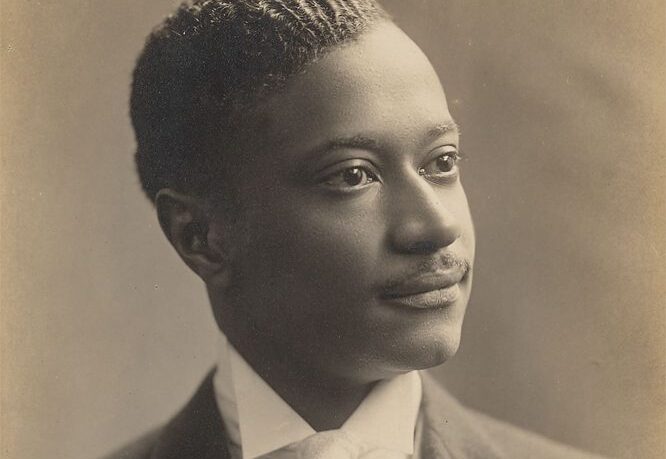Until recently, the only surviving artifacts of Will H. Dixon’s musical career are a handful of published scores from 100 years ago—but a newly discovered cache of unpublished orchestral works and popular music scores thought to be lost were discovered in a Brooklyn Heights co-op apartment. They were composed by the late Will H. Dixon, an American ragtime, classical and early jazz musician of note. Dixon was a virtuoso pianist, a prolific composer and arranger, an influential singer and songwriter, savvy publisher, and an unsung playwright. He was an acclaimed music conductor, stage manager, and animated bandleader of several pioneering musical troupes and orchestras. Dixon’s choreography was full of novelty; he was dubbed The Original Dancing Conductor by James Weldon Johnson.
This cache also includes other rare musical manuscripts dating back to 1915. Will H. Dixon died a premature death in 1917 and left behind scores of untitled compositional works, some unfinished, and many other unpublished orchestral scores. Many were composed between 1900 and 1917. Because they were stored away in the dark for decades, many of these scores are tattered, making them very fragile to handle. Some are notated with “No title, but good” written in Dixon’s own hand. He died before he could fully complete and publish many of these new works.
It was reported in the New York Age newspaper that Will H. Dixon’s “chief aim prior to his untimely death was to secure the production of an opera (mainstream) to which he had written both the libretto and composed the musical score.” Rick Benjamin’s four-year reconstruction of the Scott Joplin opera Treemonisha was recently premiered to great acclaim at San Francisco’s Stern Grove Festival.
The personal papers and archives also include a collection of African American musical ephemera reflecting the life and times of Miss Francesca “Frankye” A. Dixon, who was a Howard University professor, and the papers of Miss Dixon’s family members, including the musical manuscripts of her father Will, and the personal letters and papers of Mrs. Maude Dixon Myers. This treasure trove of historical papers and artifacts were salvaged in 2013 from the Brooklyn Heights co-op apartment cleanout where Miss Margaret Patricia Barnes last resided. Born in 1932, Miss Barnes, aka “Pat,” was a classically trained opera singer, a member of Amato Opera, Co., and a Howard University graduate of music in 1955. She inherited the Dixon’s family possessions as a surrogate. Barnes passed away in 2013.
The papers reflect the fascinating life and times of Miss Dixon and her family. The bulk of the papers and other ephemera provide an in-depth look and cultural insight into Frankye’s personal and professional activities as an accomplished classical musician, pianist, concert artist, accompanist, music educator of piano, voice, and music theory for grade, high school, and college. She was an esteemed choral-choir director and musicologist of note. Miss Dixon was well known in musical circles for her excellent scholarly work in music and academia. She performed on stage and in top music halls as the vocal coach and accompanist to a number of professional concert artists including Margaret Barnes, Aubrey Pankey, George Marshall, Margaret Tien, Louise Burge, and Italian opera singer Milo Picco, among others.
Will H. Dixon’s unpublished compositional works have remained unknown to modern scholarship until now, and have the potential to fill up a recorded 3-CD set. And according to Rick Benjamin, founding director and stage conductor of the Paragon Ragtime Orchestra, “We see Dixon’s amazing potential in his compositional writing of his instrumental pieces, particularly his four light classic works—1913–14’s “Ardente Ivresse” Valse, lente de (published in Paris by Ricordi), “Delicioso,” “Brazilian Dreams,” and “Breath of Autumn,”
Benjamin has recorded the works of several pioneering African American composers on his “Black Manhattan Trilogy” series, including several of Will H. Dixon’s orchestral classics listed above. These composers featured on the revelatory recordings of Black Manhattan represent the cream of Manhattan’s Black Bohemia’s musical happenings at the Marshall Hotel on 53rd Street. Gaining their confidence and acceptance, Dixon was invited to join the theatrical group The Frogs, Inc. after its founding in 1908. Will H. Dixon was a founder of the Clef Club Orchestra, a full-fledged member and central player in the Black Manhattan story.
RELATED: Philippa Schuyler, gifted and talented musician and writer
Will H. Dixon’s most prominent compositional scores and recorded titles include “Des Innocences douces,” “La Nativa,” “September Eve,” “The Chase Fox Trot,” “Go ‘Long, Mule, Go ‘Long” (a four-part chorus for men’s voice), “Fesia,” “Malinda,” “Carrie,” “Kid,” “Don’t Make Me Laugh Bill,” “Everybody Knows I’m Crazy ‘Bout You,” “Dance of The Bugs” and “Come Right In, Sit Right Down, And Make Yourself At Home,” a big hit made famous by Bert A. Williams. Dixon ran in the top circles of “Black Manhattan’s Music Society” (James Europe, Ford Dabney, Joe Jordan, Ernest Hogan, Williams, and Walker) while making significant contributions to American music. He experienced a decade of musical notoriety from 1905-1916, and earned membership into ASCAP and the Guild of Writers and Composers.
Will Dixon died in 1917 at the age of 38, a few months after the death of the King of Ragtime Scott Joplin who also died that year. Will Dixon composed ballards, popular and coon songs, light classical (instrumental), 16-part orchestral compositions, as well as voice and piano solos. As a playwright, he co wrote plays and composed musical comedies with a partner, Chicago’s noted Black lyricist Alfred Anderson, aka “Alf.” Dixon was, as the New York Age newspaper would later put it, “Chock Full of Ambition.”
In 1907, Dixon entered the music publishing business in New York. A firm bearing his name and moniker The Will H. Dixon Music Publishing Co. opened its doors in the Theatre Exchange Building at 1431 Broadway in Longacre Square, as it was known then. Will H. Dixon’s musical legacy has been gaining renewed interest in the past few years, and he has been the subject of recent recordings of articles, entries, honorable mentions, and newly posted biographical sketches.
Dixon submitted the following statement in the Annual Report to Howard Dean of Music Vada E. Butcher and the university’s president on behalf of her father and his musical contemporaries. “My first attempts in creative writing were focused from 1939-1950 in the role of music critic and editorial writer for the leading New York paper the Amsterdam News. This service served as a basis in my development in making my life’s work more meaningful, productive and enjoyable,” she wrote.
“While [my]writing exposure has been that of a dabbler, modestly, I can attest to the unsung contributions of my deceased father Will H. Dixon (1879-1917.) He was esteemed and respected for his popular piano and vocal publications (Schirmers, Ricordi. Penn.) He [along]with a few other living Black pioneer composers, discharged a great and central service in music to raise the level of human understanding for those of music’s (future) generation(s).”
Lawrence H. Levens, is the Custodian and Guardian of the (DBM) Barnes/Dixon/Myers Historical Harlem Papers, Archives and Musical Manuscripts Collection.
Like this:
Like Loading…



